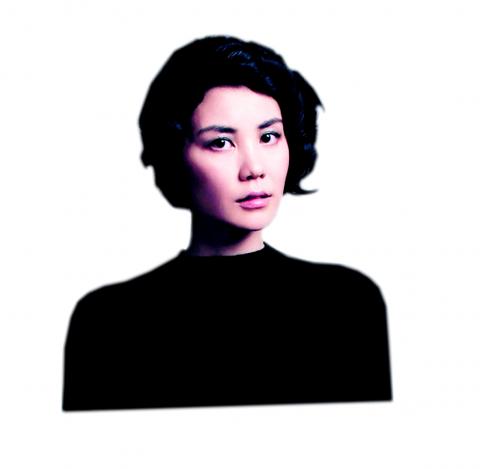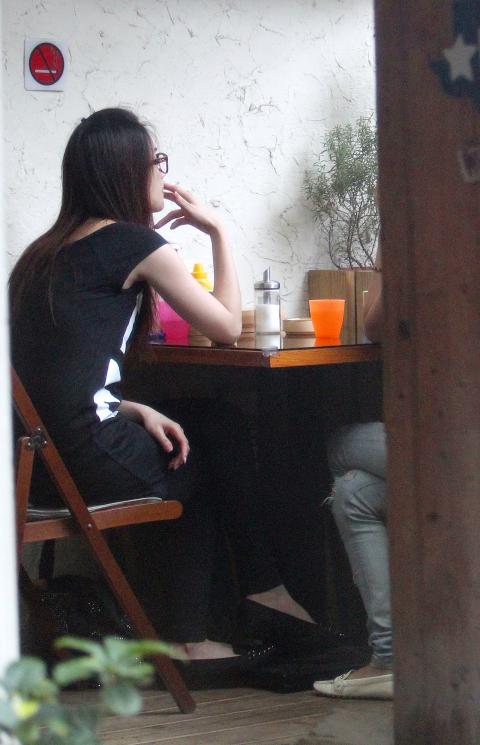Zhang Ziyi (章子怡) is threatening to sue the Apple Daily (蘋果日報) after the newspaper published reports that the Chinese actress had taken money in exchange for sexual encounters with disgraced politician Bo Xilai (薄熙來) and other high profile men.
After the rumors broke, Zhang quickly took steps to protect her reputation, including issuing a denial and flying to Hong Kong to meet with a lawyer. Zhang also put in an appearance at the Chinese Film Media Awards (華語電影傳媒大獎), appearing unperturbed as she smiled and posed for photographs on the red carpet. Though she refused to answer questions from reporters, Zhang told the press that she was happy to be at the ceremony.
But the Crouching Tiger, Hidden Dragon (臥虎藏龍) star did not mince words on her microblog. “I’m not fighting this alone,” Zhang wrote, adding that she had discussed her legal options with her lawyer, who has already sent out letters to the Hong Kong media outlets that first published reports about Zhang’s alleged paid dalliances.

Photo: Taipei Times
Disgraced Taiwanese-Japanese actress Makiyo is also doing damage control to her reputation after pleading guilty to assaulting a taxi driver. Makiyo and her friend Hsiang Ying (湘瑩), who was also at the scene of the February incident and later pleaded guilty to perjury, were recently spotted selling cookies at a charity event. The friends managed to raise NT$4,000 for physically disabled children.
Though she has been unemployed since having her work permit revoked, Makiyo told reporters that she hasn’t been idle. In addition to abstaining from alcohol and pursuing volunteer opportunities, Makiyo has taken up yoga and horse riding lessons.
Like her friend, Hsiang Ying has been unable to work and now lives off her savings. The actress is occupying herself with yoga, speech training classes and helping her mother sell fried chicken.

Photo: Taipei Times
Makiyo says she hopes to return to show business one day, but is keeping a pragmatic attitude.
“I’ve worked in the industry for 14 years, so it’s just another form of work to me,” she said. “If I can’t go back, it’s fine. I don’t want to keep depending on the entertainment business.”
Despite their charity work, Makiyo and Hsiang Yang still have a long way to go before they return to the good graces of the media. A Liberty Times reporter noted the irony of the two friends taking a taxi after the charity event. The driver dropped them off at a cafe where Hsiang Yang puffed away on a cigarette under a “no smoking” sign. The cafe’s owner later told the reporter that she granted Hsiang Yang permission to smoke because she was outside.
Afterward, the same taxi arrived to take the two women to their next destination. The Liberty Times wondered if Makiyo now has a personal driver because other cabbies are wary of her patronage. Makiyo’s manager insisted that while his client always calls the same company, she usually takes different taxis.
Faye Wong’s (王菲) daughter has also been living in seclusion. The teenager is not in trouble with the law, but with her parents, who are fed up with the girl’s rebelliousness. According to media reports, Dou Jingtong (竇靖童), Wong’s daughter with her first husband Dou Wei (竇唯), has turned into a back-talking party girl.
After repeatedly clashing with stepfather Li Yapeng (李亞鵬), Dou Jingtong was shipped off to a Shanghai boarding school. After the 15-year-old managed to sneak off to a nightclub with a male classmate, her angry mother ordered her home to Beijing. Dou Jingtong is now under strict supervision when not in class.
She may not be allowed out of the house, but Dou Jingtong found yet another way to rebel last week. Like many teenagers, she took to her blog to complain. “Life is just so limited wen [sic] ur [sic] young,” Dou Jingtong wrote in English. “You can never make your own decisions of where you want to live, what you want to do.”

On April 26, The Lancet published a letter from two doctors at Taichung-based China Medical University Hospital (CMUH) warning that “Taiwan’s Health Care System is on the Brink of Collapse.” The authors said that “Years of policy inaction and mismanagement of resources have led to the National Health Insurance system operating under unsustainable conditions.” The pushback was immediate. Errors in the paper were quickly identified and publicized, to discredit the authors (the hospital apologized). CNA reported that CMUH said the letter described Taiwan in 2021 as having 62 nurses per 10,000 people, when the correct number was 78 nurses per 10,000

As we live longer, our risk of cognitive impairment is increasing. How can we delay the onset of symptoms? Do we have to give up every indulgence or can small changes make a difference? We asked neurologists for tips on how to keep our brains healthy for life. TAKE CARE OF YOUR HEALTH “All of the sensible things that apply to bodily health apply to brain health,” says Suzanne O’Sullivan, a consultant in neurology at the National Hospital for Neurology and Neurosurgery in London, and the author of The Age of Diagnosis. “When you’re 20, you can get away with absolute

May 5 to May 11 What started out as friction between Taiwanese students at Taichung First High School and a Japanese head cook escalated dramatically over the first two weeks of May 1927. It began on April 30 when the cook’s wife knew that lotus starch used in that night’s dinner had rat feces in it, but failed to inform staff until the meal was already prepared. The students believed that her silence was intentional, and filed a complaint. The school’s Japanese administrators sided with the cook’s family, dismissing the students as troublemakers and clamping down on their freedoms — with

As Donald Trump’s executive order in March led to the shuttering of Voice of America (VOA) — the global broadcaster whose roots date back to the fight against Nazi propaganda — he quickly attracted support from figures not used to aligning themselves with any US administration. Trump had ordered the US Agency for Global Media, the federal agency that funds VOA and other groups promoting independent journalism overseas, to be “eliminated to the maximum extent consistent with applicable law.” The decision suddenly halted programming in 49 languages to more than 425 million people. In Moscow, Margarita Simonyan, the hardline editor-in-chief of the